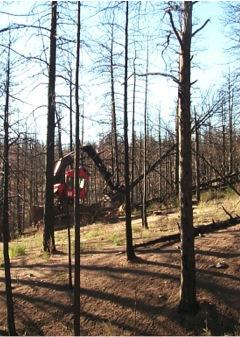
Salvaging Ecosystems: Benefits of Timber from Burned Trees

Feller bunchers are heavy equipment used in salvage logging to cut down burned trees and pile them up.
Credit: Michigan Tech
It sounds like a good idea, since even the timber from burned trees can be used for lumber. Economic benefit can come from otherwise devastated land. Even the name has a warm, fuzzy ring to it: salvage logging.
The only problem is, the ecological effects are unknown.
Actually, that's not quite true. For over a decade, Joseph Wagenbrenner, assistant professor in Michigan Technological University's School of Forest Resources and Environmental Science, has been examining salvage logging at four forest fire sites in Montana, Colorado and Washington. He and his research team studied the effects of salvage logging on the ground cover, soil compaction, sediment in water runoff and regrowth of vegetation, compared to control plots that were not logged after a fire.
Specifically, they looked at the impact of various salvage logging practices, including the trails made by the most commonly used equipment: feller bunchers–heavy machines that drive uphill, cutting and piling up trees–and skidders, which pick up the piles of trees and drag them back downhill.
They found that the amount of sediment in runoff water increased measurably on the smaller plots, but the increase was not consistent on larger tracts of land. The amount of sediment running downhill and the compaction of the ground was greater where the feller bunchers and skidders were used. The more firmly compacted ground becomes, the less water can soak in and the more runoff and erosion can occur.
Wagenbrenner and colleagues published results of the US Forest Service-funded study in the January 2015 issue of the journal Forest Ecology and Management.
Why is sediment an issue? It can cause flooding, when streams and reservoirs get clogged. At one of the study sites, where the Hayman fire burned 140,000 acres of the Pike-San Isabel National Forest in central Colorado, the sediment runoff was so bad that one of the main reservoirs serving Denver had to be dredged.
Sediment can also damage fish habitat, raising water temperature and killing food sources. And it fills pools and streams with organic matter that is hard for water treatment plants to process, Wagenbrenner explains.
Sometimes salvage logging operations leave the small branches and treetops on the ground. This material, called slash, helped ameliorate the erosion and sediment problem, the researchers found.
His team's recommendations for best management practices for salvage logging include:
- Leave slash on the ground
- Break up long feller-buncher and skidder trails with “water bars”–mounds of dirt that slow and divert runoff.
- Decompact the soil after heavy equipment is used.
- Consider replanting vegetation, which works better than slash because it roots in the soil.
Michigan Technological University is a leading public research university developing new technologies and preparing students to create the future for a prosperous and sustainable world. Michigan Tech offers more than 130 undergraduate and graduate degree programs in engineering; forest resources; computing; technology; business; economics; natural, physical and environmental sciences; arts; humanities; and social sciences.












